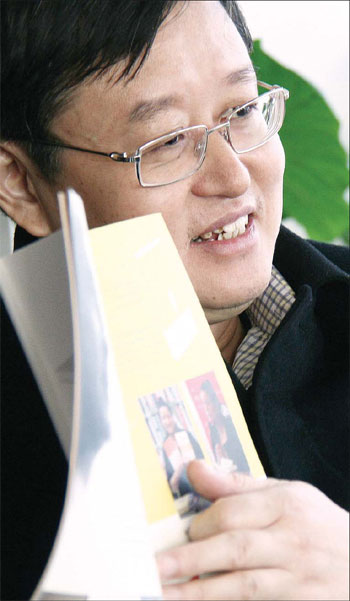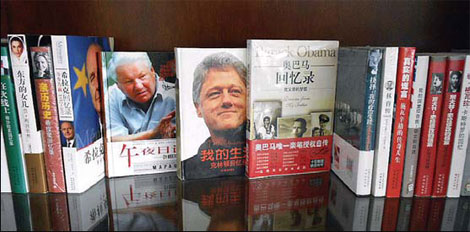Reading between the lines
Updated: 2012-01-05 10:09
By Chitralekha Basu (China Daily)
|
|||||||||||
 |
|
Yilin Press president Gu Aibin introduces the publishing house. Photos by Song Wenwei / China Daily |
 |
| Some of Yilin's publications on display. |
One of the country's biggest publishers of world literature in Chinese translation says it owes its success to its ability to predict domestic book trends. Chitralekha Basu reports.
At first glance, the book-lined reception room of Yilin Press, located in one of the hushed floors in a massive building on Hunan Road in Jiangsu's provincial capital Nanjing, seems like a regular office. It's a little too quiet, perhaps, almost as if it was drawing inspiration from the still blue waters of the Xuanwu Lake across the road. A handful of trophies and citations perched high on the glass-panel bookcases serve only as a token remembrance of Yilin's eventful journey and exponential growth since its founding in 1988. Yilin Press is the foremost among the three leading publishing houses in China dedicated to translation of foreign literatures. It exceeds its much-older and more visible fellow publisher, the Beijing-based People's Literature, which was founded in October 1949, in terms of volume and market share. China Book Business Report ratings put Yilin Press on top of all Chinese publishing companies producing literary translations, in terms of the number of titles released.
Although it may not appear as such from the outside, "the company is big", its president Gu Aibin says.
"There are 140 people on the staff. This year, we put out nearly 800 publications, including those jointly published with other houses. The market, for us, has truly expanded."
Its genesis was in the form of a magazine, Translations, launched in 1979 to open a window on world literature for a Chinese audience, starved of literature from outside the country for decades - and especially during the "cultural revolution" (1966-76).
Yilin, which evolved out of this endeavor to bring some of the world's finest, most representative, literary voices to a Chinese-speaking audience in 1988, today registers annual sales of more than $30 million.
It has tie-ups with the heavyweights of publishing the world over - Penguin, Random House, Simon & Schuster - as well as some of the very distinguished university presses, such as those of Columbia, Cambridge and Yale. From British playwright Harold Pinter's absurd theater to the pulp fiction of John Grisham, and from Isaiah Berlin's seminal treatise on Liberty to Chinese-English dictionaries, Yilin covers quite a range.
One of the thrills of working for a publishing house that registers steady growth is to be able to anticipate what might capture the readers' imaginations at a time marked by general cynicism about reading and short attention spans.
One of Yilin's recent publishing coups that paid off extremely well was the simultaneous release of the Chinese edition of Anthony Horowitz's pastiche on Conan Doyle's immortal creation, Sherlock Holmes. The House of Silk, published in November 2011, sold more than 110,000 copies of its Chinese translation in about a month.
An incredibly large number of qualified translators - who take up original texts in English, French, German, Russian, Japanese, Spanish and Italian - contribute to Yilin's ever-widening pool of resources.
"We focus on the major international prize-winners," deputy editor Yao Yi says.
"We seek out new writers, who we think will be very successful in the future."
For example, Yilin published the translation of Doris Lessing's The Golden Notebook 20 years before she won the Nobel Award.
Other Nobel recipients Yilin had published long before they won the award include South African novelist JM Coetzee and the Trinidad-born writer who has made the British Empire his primary engagement, VS Naipaul.
Barack Obama's autobiographical Dreams from My Father: A Story of Race and Inheritance, which subsequently became one of Yilin's major bestsellers, running into several reprints, was published in Chinese before the African-American US senator won the presidential elections in 2008.
Former British prime minister Tony Blair's biography and former French president Jacques Chirac's memoirs saw glitzy launches in China's big cities, attended by the two high-profile statesmen.
Particularly the Blair book, authored by Anthony Seldon, was launched with a massive campaign at this year's Beijing International Book Festival in September, with extensive coverage by such international media as BBC China and Phoenix, Hong Kong.
"The campaign helped spread Yilin's influence in the publishing scene in China," the company's assistant president Shirley Xie says.
"It was a major event in Chinese publishing in general, attended by Liu Binjie, the director of the General Administration of Press and Publications."
The campaign boosted sales. The original print run of the book on Britain's former prime minister - whose work is now more visible as a peace-broker in the Middle East and a campaigner of the ambivalence of faith in the time of globalization in some of the world's leading academic institutions - has since been tripled.
"We have a good brand reputation," Gu says.
"We are highly respected and honored by officials in top posts and common readers alike. Our English learning products are beloved by the students and highly recommended by academics."
Even as the company's leaders bask in this well-earned glory, they are keeping an eye on the market, continuously re-assessing what resonates with China's mostly young reading public.
US author JD Salinger's 1951 cult classic on adolescent angst, Catcher in the Rye, remains a bestseller. The reclusive author's passing away in January 2010 might have rekindled an interest in him.
Xie says China's post-1980 generation strongly identifies with Holden Caulfield, Salinger's icon of teenage confusion. They want to read authors like the Canadian fiction writer Alice Munro, whose work is marked by a deep empathy with human failure.
"In this time of fast-paced development, collapse of moral values, and the ever-widening gap between the rich and the poor, young Chinese readers are under a lot of pressure," Xie says.
American writer Raymond Carver - Yilin has translated a huge body of his work - has found favor with young Chinese readers. That's because of his works' accessibility and because his books' brevity matches the short attention spans of a reader on the go.
Highlights of forthcoming publications include a collection of British author Julian Barnes' fiction, fresh in the limelight after Barnes won the Man Booker Prize in 2011.
Also on the way is the memoir of Nobel Peace Prize-winner and former UN secretary general Kofi Annan and that of the US' former vice-president Dick Cheney. Both offer insiders' views from the corridors of power.
"We are planning a book launch in China with at least one of them," Xie says.
Song Wenwei contributed to the story.